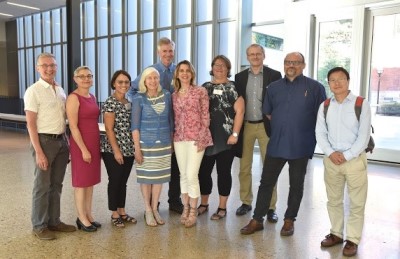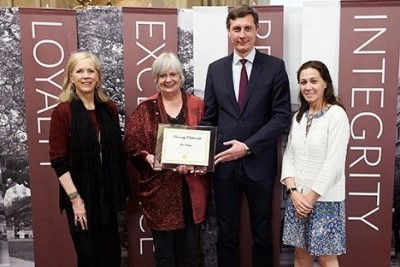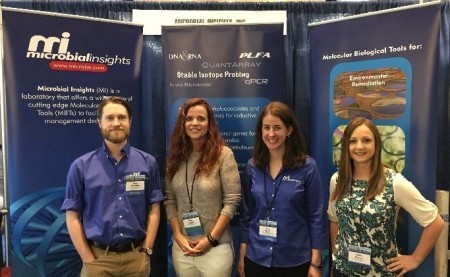Science Leadership
Superfund Research Program (SRP) staff and grantees are committed to advancing SRP research by presenting innovative findings, tools, and technologies to stakeholders in academia, government, and local communities.

SRP Health Scientist Administrator Danielle Carlin, Ph.D., helped organize and chaired a scientific session at the 16th International Congress on Combustion By-Products and Their Health Effects ,held July 10 - 12 in Ann Arbor, Michigan. She also moderated a roundtable session focused on translating research on combustion by-products and engaging communities. The meeting fostered interactions between diverse groups of scientists and policy makers focused on the formation, movement, health effects, and clean-up of combustion by-products.
SRP Health Scientist Administrators Michelle Heacock, Ph.D., and Heather Henry, Ph.D., engaged with researchers at the Society of Environmental Toxicology and Chemistry's meeting on Environmental Risk Assessment of Per- and Polyfluoroalkyl Substances (PFAS) .During the poster session, they highlighted SRP grantees researching how PFAS move through the environment and how the compounds affect health. SRP grantees also are developing tools to remove PFAS from the environment and reduce exposures.
SRP Director Bill Suk, Ph.D., M.P.H., Health Specialist Brittany Trottier, M.P.H., and Heacock shared their expertise and discussed ways to address pressing environmental health issues at the Pacific Basin Consortium (PBC) Conference ,held September 16 - 19 in Kyoto, Japan. The meeting focused on assessing and mitigating environmental exposures in early life.

Texas A&M University (TAMU) SRP Center Director Ivan Rusyn, Ph.D., became one of the first TAMU faculty members to be awarded the title of University Professor ,recognizing his significant research accomplishments. As part of the University Professor accolade, the recipient can name their professorship after a faculty member who had a significant impact on their career and studies. Rusyn chose the late Professor K.C. Donnelly as his award's namesake. Donnelly was a longtime SRP grantee, dedicated researcher and mentor, and a key player in establishing an SRP Center at TAMU.
At the Fish Smart Celebration ,members of the Duke SRP Center worked to protect the health of subsistence fishers who cast their lines in the Cape Fear River in Wilmington, North Carolina. The May event, held in partnership with Cape Fear River Watch ,was part of the Center's "Stop, Check, Enjoy" campaign.
Carlin presented SRP research during the National Drought & Public Health Summit in Atlanta on June 17. The summit brought to the attention of government, tribal, non-profit, and academic participants the effects of drought on public health. Carlin highlighted drought-focused work from SRP Centers and discussed how they collaborate with communities of semi-arid and arid regions to improve long-term health outcomes.

SRP researchers were on hand at the Battelle Fifth International Symposium on Bioremediation and Sustainable Environmental Technologies to discuss advances in green and sustainable approaches to cleaning up hazardous waste sites. Among them, scientists and engineers from the SRP-funded small business Microbial Insights described their work using big data and integrating molecular tools to assess conditions that can affect bioremediation.
The 2019 PFAS Second National Conference ,held June 10 - 12 at Northeastern University in Boston, brought researchers from diverse disciplines together to discuss cutting-edge PFAS research and strategies to protect human health. The Northeastern University and University of Rhode Island SRP Centers helped organize the event.
University of California, Berkeley SRP Center Director Martyn Smith, Ph.D., explained key characteristics and the benefits of identifying them at the Converging on Cancer Workshop, held April 29 - 30 in Washington, D.C. He also explained how key characteristics can be used to make predictions about different chemicals.
The Oregon State University SRP Center hosted high school students from tribal nations for its third annual Tribal Youth Campus Tour .During the two-day learning exchange, tribal youth from the Columbia River region learned about SRP research, environmental health, and career opportunities in science, technology, engineering, and math.
to Top



